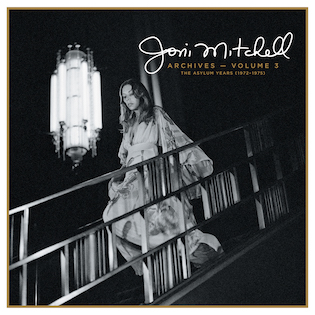The first two discs encompass the making of the For The Roses album, beginning with a handful of solo and pristine demos—the first two from 1971, despite the box subtitle—including the stunning, otherwise unknown “Like Veils Said Lorraine”. Then we go to Carnegie Hall for a widely bootlegged, rapturously received performance that spills over to disc two. She plays the “hits”, but several Roses songs are new to the crowd, as the album wouldn’t be out for another nine months. She brings out various “friends” for “The Circle Game”, including Jackson Browne, who opened the show. (He’s listed as one of the choristers “possibly” in attendance; the “David” she mentions is likely Geffen, who’s also listed.)
James Taylor sits in on an acoustic rock ‘n roll medley and “Electricity” from further Roses sessions, whereas a try of “You Turn Me On I’m A Radio” with Neil Young and two Stray Gators was wisely redone elsewhere. (Similarly, that song and “See You Sometime” were also tried days later with the same Stray Gators, but not Neil.) Further alternate mixes include “Cold Blue Steel And Sweet Fire” where she overdubs a vocalization of the eventual sax part. “Sunrise Raga” is a fascinating mostly instrumental with her acoustic accompanied by tabla, and she was clearly interested in covering “Twisted” this early. (It’s nice to hear a version without Cheech & Chong, too.) A solo “Judgement Of The Moon And Stars” from a London concert is enthralling.
Disc three begins with a stunning 12-minute piano-and-vocal suite that goes from “Down To You” through “Court And Spark” and “Car On A Hill” back to the beginning. She must have considered this for release, as it features multiple Jonis harmonizing on the “Car” section. Other demos for the Court And Spark album are refreshing to hear without the studio adornments. We get three versions of “Raised On Robbery”—an acoustic with trilling chorused Jonis and percussion, a rockin’ one from a Graham Nash session, and the one recorded a day later with the Tonight’s The Night band that was on Neil Young’s second Archives box. As with the Roses portion, alternate mixes from the sessions are capped with an instrumental sketch, in this case the Greek-flavored “Bonderia”.
The balance of disc three and all of the fourth are devoted to a more laid-back L.A. concert with the support of Tom Scott and the L.A. Express, providing something of an alternate to Miles Of Aisles. (Most of that album came from shows performed five months later, and features some different selections from what’s here.) Whereas that album was programmed as a double album of four sides, here we have a complete show that moves through the dynamics of a full band for a half-hour, through a solo section featuring some lengthy conversational intros, and back with the band. While Scott can be a little overbearing in some contexts, his simple touches on “Cold Blue Steel” and “For Free” are welcome, and she works very well with the whole band. Oddly, there’s no “thank you, good night” after the last song; the disc simply ends after “Car On A Hill”.
An early live recording of “Jericho” starts the fifth disc, followed by “Woman Of Heart And Mind” in front of a quiet Wembley audience during the 1974 CSNY tour. These acoustic performances provide an excellent segue to seven demos for The Hissing Of Summer Lawns, not all of which have been bootlegged before (and there are some demos out there not collected here). Anyone put off by the arrangements on the finished album should appreciate these all the more. “Harry’s House”, for example, does not have the “Centerpiece” interlude, and an early “Dreamland” is accompanied only by guitar. Session outtakes from the album include “The Jungle Line” without the Burundi drummers or synthesizer, and another try at “Dreamland” with a band backing.
Her first Archives box fascinatingly traced her growth, and the second provided a fine companion to her first four albums. The period covered in this third box went widely off most people’s expectations—not unlike Neil Young’s “ditch” era—with varying critical and commercial success. As we can hear here, everything, from the biggest band arrangement to the solo performances, started with words and a melody. While she may have identified with painters, whom she referenced on Miles Of Aisles (“nobody ever said to Van Gogh, ‘Paint a Starry Night again, man!’”), her sketches are as fascinating as the finished works. And my goodness, was she prolific.
Joni Mitchell Archives—Volume 3: The Asylum Years (1972-1975) (2023)—4

No comments:
Post a Comment